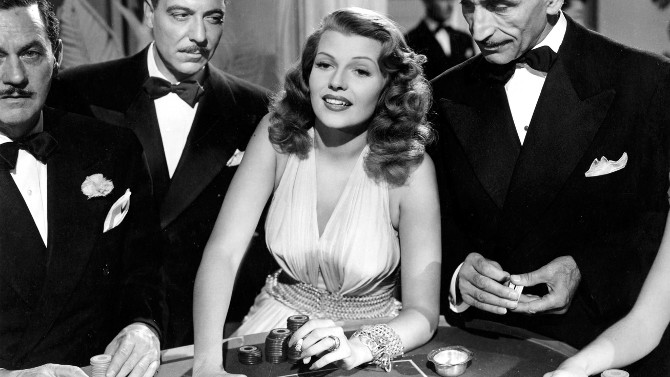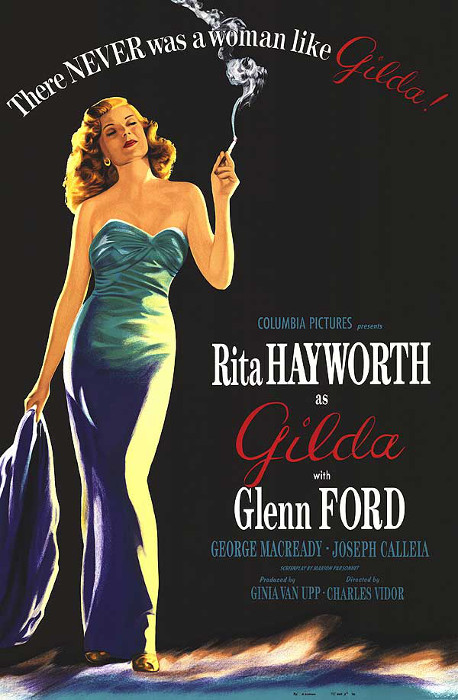There is nothing like a memorable entrance/introduction to an onscreen character. The film that I am reviewing today has three. As the camera pans up at the very beginning of the movie, we are nearly hit by voice over narrator Johnny Farrell’s (Glenn Ford) trick dice. As he leaves the sketchy gambling room (after easily winning some cash with his fake cubes), he is held at gunpoint by a robber. In comes his saviour and soon to be boss, Ballin Mundson (George Macready), who uses his ‘best friend’, a walking stick that hides a dangerously long and sharp bayonet to save the nervous man. But it is the third and final entrance that blows the other two away. After Farrell begins to work for Mundson for some time, he learns, upon his bosses return from a trip, that he has gotten married. As the two enter the dame’s bedroom, her husband asks, “Gilda, are you decent?”. Rita Hayworth’s title character, after a slight pause, pops up on the screen, and with a sensual flip of her perfect locks, flirtatiously responds “Me?”. Dare I say, drama ensues.
The 1946 film Gilda, directed by Charles Vidor, is an excellent motion picture that feels somewhat similar to 1942’s Casablanca, though it is a bit more melodramatic, while also falling into the film-noir genre. The story, much like its predecessor, is set in a foreign locale (this time in Buenos Aires, Argentina), where our main characters are running away from their pasts. Gilda also contains some connections to World War II, including a German storyline. Then, there is the appearance of the dame, and we quickly learn that there is a history between her and Farrell – once again creating a rather unique love/hate triangle. Instead of a café that features gambling, this time it is a hotel that features blackjack, roulette and other games. Similarly, there is a cop meandering around the establishment, namely Detective Maurice Obregon (Joseph Calleia), who perhaps has more than one agenda. To replace Sam, there is Uncle Pio (Steven Geray), and though he does not have the history Sam and Rick had, there is a rather interesting working relationship between him and Farrell. There is also a scene with a plane and an ending that feels somewhat in the same vein. I am not saying these things to put this film in a negative light, but simply to draw the parallels between the two. It must also be said that despite all of the similarities, Gilda still feels very different.
Mundson is the owner of the hotel and illegal gambling establishment, and a short time after saving Farrell’s life, he hires the lowlife American to manage the joint. From a modern perspective, Mundson resembles a James Bond villain – not only because of his hidden weapon, but also due to the fact that he is the head of a cartel and maniacally plans to rule the world. It is Farrell that runs his day-to-day affairs which, I guess, would make him the henchman. As the film continues, his job seems to center more around managing and hiding the numerous trysts of Gilda from his boss and friend. The two powerful men make it clear that they believe in making their own luck – which is evident from Mundson’s perspective on controlling the world and Farrell’s tricksy manoeuvres that make him a constant victor at the tables.
Things only grow more complicated, as it is quite evident that Gilda is also trying to get back at, as well as seduce, her former lover – who clearly hurt her in their past relationship. The two ominous German fellows, who clearly have something at stake with Mundson, are closing ranks around the boss. Similarly, the Detective is chomping at the bit to make his name by gathering intel that will lead to capturing Mundson and his illegal cartel.
Gilda is a wonderful movie that is a treat to watch. It is near perfect in its visual aesthetic. It is beautifully shot and framed, with each camera movement or use of shadow and light being placed specifically where it is supposed to be. There are also the intricate movements of Rita Hayworth’s Gilda – the way her hair moves, her straps fall, or the way she plays guitar being more than breathtaking. A stocking being pulled up a smooth leg, or her evening negligee and velvety shoulder-revealing dress make her feel just as sexy as if she were parading around in the nude. There is a reason why they nicknamed her ‘The Love Goddess’. Both renditions of her famed song “Put the Blame on Mame” are intimate and revealing.
Rita Hayworth’s performance really is a revelation. She plays Gilda beautifully, creating an intoxicating concoction of sexuality, sensuality, innocense, pain and longing. It is quite difficult to read the femme fatale – is she a dangerous game-playing manipulator, a loose dame, a woman out for revenge, a lady wearing an unreadable mask, or simply a wounded human being with a pained past (or a combination of all of these elements)? In any case, she is definitely one of the most well rounded femme fatale’s in film-noir history. Other parts played by the rest of the cast (including Glenn Ford’s somewhat gruff and dishevelled narrator, who has a cruel streak running through his veins, or Mundson’s reserved, yet psychopathic boss) are also enjoyable, but there is a reason this one is called Gilda. Check out the striking one sheet poster for the film – it highlights her noirish effervescence.
There is also the requisite sharp, hard boiled dialogue. You cannot have a film-noir without it – and the voice-over narration helps as well. One such example: “You’d think a bell would have rung, or, you’d think I’d `a had some instinct of warning. But I didn’t. . . I just walked right into it.” This film also has a rather harsh yet fitting description of the dangerous femme fatale: “because it looks like one thing, then right in front of your eyes it becomes another thing.” A scene that shows off some of the deft humour is when Farrell and Uncle Pio insult the two Germans before a masquerade fiesta prior to Lent. I could go on quoting lines or describing scenes for hours, but I think you get the point.
Gilda is an excellent film-noir that oozes jealousy, lust, sensuality, hate and desire. There is so much planning and detail that goes into a movie like this: from glittering sets and mysterious shades of grey, to Hayworth’s lush hair and mesmerizing choreography, each moment feels flawless. It is not surprising that directors like Martin Scorsese and Baz Luhrmann speak so fondly of this picture. The ending may feel a bit less noirish than other era picks, but this only adds to the enjoyability of the movie. Hopefully you will give this classic a shot. . . and if you don’t like it, you can “put the blame on Mame”.


